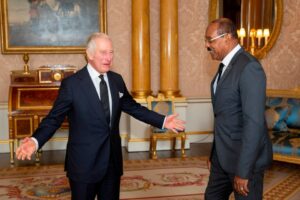Pope Leo XIV, a lifelong American citizen, questions the viability of maintaining dual citizenship as he leads Vatican City, a sovereign state. Despite U.S. law permitting dual citizenship, especially among foreign heads of state, the implications of such status raise intricate legal considerations. While past Popes have retained their native nationalities, the current Vatican leadership's stance on Pope Leo’s future remains uncertain.
Pope Leo's Citizenship Dilemma: American vs. Vatican

Pope Leo's Citizenship Dilemma: American vs. Vatican
The complexities of dual citizenship arise as Pope Leo XIV navigates his role as an American citizen and leader of Vatican City.
Pope Leo is not only an American citizen but also a recognized head of state of Vatican City, which brings forth questions regarding his ability to hold multiple citizenships. The U.S. State Department confirms that dual citizenship is allowed, as long as the individual meets specific criteria. According to them, a dual citizen serving as a foreign head of state usually retains their American status unless they voluntarily renounce it.
Historically, U.S. citizenship has been retained by several foreign leaders. For instance, former Somali president, Mohamed Abdullahi Mohamed, was a naturalized American citizen until he renounced it in 2019, amid concerns of divided loyalties. The Holy See, although a sovereign government, opts for a neutral position in global politics and has permitted previous Popes to keep their original citizenships, including Pope Francis who maintained his Argentine nationality.
Pope Leo also holds citizenship in Peru, which permits dual citizenship, but the legal implications surrounding his role as a foreign leader remain vague. The complexities of his situation illustrate the intricate balance between international law and citizenship rights, yet the Vatican has remained silent on whether Pope Leo will take any steps to clarify his citizenship status.
As discussions continue regarding the nuances of dual nationality for a sitting Pope, the implications for U.S.-Vatican relations and international law remain critical.
Historically, U.S. citizenship has been retained by several foreign leaders. For instance, former Somali president, Mohamed Abdullahi Mohamed, was a naturalized American citizen until he renounced it in 2019, amid concerns of divided loyalties. The Holy See, although a sovereign government, opts for a neutral position in global politics and has permitted previous Popes to keep their original citizenships, including Pope Francis who maintained his Argentine nationality.
Pope Leo also holds citizenship in Peru, which permits dual citizenship, but the legal implications surrounding his role as a foreign leader remain vague. The complexities of his situation illustrate the intricate balance between international law and citizenship rights, yet the Vatican has remained silent on whether Pope Leo will take any steps to clarify his citizenship status.
As discussions continue regarding the nuances of dual nationality for a sitting Pope, the implications for U.S.-Vatican relations and international law remain critical.





















